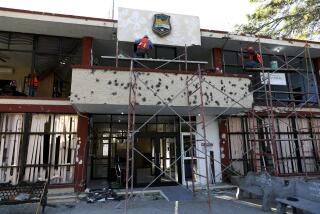Meese Sees Arms Gap in Bolivia Drug War
- Share via
CHAPARE, Bolivia — Atty. Gen. Edwin Meese III, shocked by the sight of Bolivian anti-narcotics police carrying World War I-era weapons held together by tape, said Tuesday that a congressional ban on U.S. arms supplies to the South American nation must be eased to help combat its massive cocaine trade.
“There is no way they’re going to be able to continue with the increasing violence that is a reaction to their very effective efforts without some new armament,” Meese said after touring a remote base camp here where U.S. officials are training the anti-narcotics forces.
Raising coca in Bolivia is not illegal, but processing it into cocaine is. The nation’s 550-man Rural Mobile Police force regularly searches the thick jungle here for signs of processing and seeks to interdict shipments of chemicals used to refine cocaine.
U.N., Europe Should Help
Meese’s inspection of the Bolivian forces came on the final leg of his five-country mission to rally efforts against the Latin American cocaine trade. Meese and officials traveling with him have indicated that they are greatly pleased with the results of the trip thus far and believe that their efforts eventually will put a significant dent in the production of illicit cocaine.
The attorney general, anticipating a possible request for increased U.S. aid at a meeting today with President Victor Paz Estenssoro, stressed that Bolivia and other nations should also direct such requests to the United Nations and to European countries being hit by a cocaine surge. “You can’t always depend on the United States to do it,” he said.
In inspecting a squad of Bolivian police being trained by U.S. Army personnel, Meese found them carrying rusted Springfield and M-1 rifles, many of which had split stocks and were bound together by tape. The attorney general was told that the Bolivians leave the camp with about half the weapons operable and carrying only three rounds of ammunition each.
Meese, clearly appalled by these conditions, described the police force’s need for working weapons and ammunition as “critical.”
But the U.S. Foreign Assistance Act, enacted in the early 1970s after some U.S.-aided police squads were linked to torture and other acts, outlaws assistance to foreign police forces. Congress later allowed some exceptions, including aid to police assigned to narcotics matters, but only non-lethal assistance.
Nevertheless, Meese said that “the extreme situation here . . . indicates that perhaps we need a legislative exception for Bolivia or some other means where we can legitimately provide the weapons.”
The attorney general said that he has received no request for U.S. arms from the other cocaine-producing and shipping countries he has visited--the Dominican Republic, Colombia, Ecuador and Peru--and voiced hope that he could overcome any congressional doubts about providing Bolivia with such aid.
“We would ensure adequate controls on the use of the weapons,” Meese said. “I don’t think anyone appreciates the seriousness of the problem.”
Step Up Efforts
Although the Bolivian police have encountered little violence as they have stepped up their interdiction efforts in recent months, U.S. authorities expect them to face more threats as they expand their efforts and if Bolivia enacts a proposed law against growing most coca.
In a symbolic demonstration of increasing international success in dealing with the cocaine problem, Meese hurled a kerosene-soaked torch to ignite stacks of firewood and destroy hundreds of kilograms of cocaine paste.
Later, Meese--his khaki safari trousers splattered with jungle mud--dined on C-rations with the U.S. advisers before leaving the base camp for his return to Santa Cruz. There, he boarded his Air Force jet for La Paz, where he is scheduled to meet today with Bolivia’s president.
More to Read
Sign up for Essential California
The most important California stories and recommendations in your inbox every morning.
You may occasionally receive promotional content from the Los Angeles Times.













